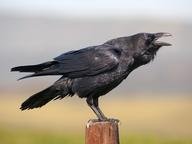Quiz Answer Key and Fun Facts
1. As "The Raven" opens, the narrator is clearly trying to distract himself from lamenting the death of a young woman. When reminiscing about her name, the narrator remarks that his lost love was named by certain supernatural beings. A Major League Baseball team (American League) is named after these creatures as well. What kind of beings does he mention?
2. What is the name of this maiden for whom the narrator grieves?
3. The narrator's lonesome reverie is disturbed when someone knocks first on his door, and then on his window. Upon investigation, he discovers that there is a raven outside of his window. When the narrator opens his window, the Raven sits upon a bust in the narrator's chamber. The bust is named for an epithet of the Greek goddess Athena. Upon whose bust does the Raven perch?
4. Now pondering his avian guest, the narrator begins to guess where his visitor is from. In another classical reference, the narrator wonders if the Raven hails from the "Night's Plutonian shore." To which Roman god does "Plutonian" refer?
5. Although the Raven does distract him from his mourning, the narrator's thoughts eventually return to his lost love. As he is grieving anew, he begins to feel a new presence in the room. What heavenly beings, which are thought to be the highest order of angels, does the narrator believe have come to give him relief from his mourning of his love?
6. In addition to the comfort provided by the presence of heavenly creatures, the narrator speculates that heaven has sent him an elixir he must drink that will prevent him from more lamentation. What drug does the narrator claim he needs to get over the loss of his love?
7. Just as the narrator begins to get some peace of mind (claiming he will drink the elixir and "forget this lost Lenore"), the Raven breaks in with his infamous "Nevermore." This interruption causes the narrator to continue his musings on the Raven's home. Which of the following is NOT one of the places the narrator suspects the Raven originates?
8. The narrator then asks the Raven a series of two questions. The first concerns whether he will ever be able to get over his love's death. In doing so, the narrator mentions a specific "balm" that will help him heal. Where does the narrator hope to find this balm to mend his broken heart?
9. Upon hearing a negative reply to his last question, the narrator wants to know "Tell this soul with sorrow laden if, within the distant Aidenn/It shall clasp a sainted maiden..." Aidenn is an alternate name for what paradise?
10. Some have speculated that the character of the Raven was inspired by a raven in Dickens' "Barnaby Rudge." Its name is also a term used to describe technicians on a film or theatre set. Which of the following is the name of this earlier feathered character?
Source: Author
nakarinna
This quiz was reviewed by FunTrivia editor
MotherGoose before going online.
Any errors found in FunTrivia content are routinely corrected through our feedback system.

